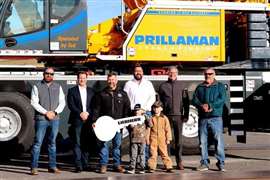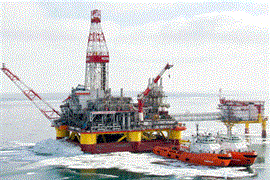Regional Report: Russian challenges
12 November 2014

There are not many people who are up-beat about the Russian market at the moment. As Scott Hazelton writes in this month’s Economic Outlook, growth is at best weak in the construction market.
But that is not to say that there aren’t good projects coming through. There is investment in infrastructure, oil & gas projects and of course development around venues and infrastructure for the 2018 World Cup, but there are still issues.
Construction equipment rental companies such as the Cramo Group have reported challenging conditions, which it believes have been influenced by the ongoing tensions between Russia and Ukraine.
Nikita Krotkiy, of the RusRental organisation, said that construction sector conditions had indeed been turbulent over past few months following trade sanctions being imposed – which have targeted Russia’s banking, energy and defence sectors.
However, the rental sector expert said factors such as the World Cup and other infrastructure deals would improve the economic picture. In his opinion, the knock-on effect would be growth of between +3% and +5% next year in the equipment rental market.
He said, “There is a reduction in demand for new equipment, both Russian and equipment produced overseas, though demand in the rental sector remains stable.
“As a result of difficulties with new equipment sales, dealers are ready to offer special purchase conditions for rental companies – which is a good investment driver for the rental industry.”
One high-profile equipment supplier in Russia is JCB, whose dealer Stroykomplekt opened a US$ 9.7 million facility at Ekaterinburg last year. However, JCB said there has been a sharp market decline this year. Consequently, it has just announced 150 redundancies at its UK offices owing to a “severe decline” in world markets.
A JCB spokesperson said, “Russia is a very important market for JCB and has been for more than 30 years. The Russia-Ukraine crisis has had a particularly significant impact on JCB with sales to both countries dramatically down over the past three months. For the six months to June 2014, Russia was down by -22%.
“Despite the current difficult market conditions JCB Russia has significantly invested in the promotion of JCB’s machines and service back up by attending leading exhibitions in Russia.
“Large numbers of JCB machines, including backhoes, excavators and skid steers, have also been sold to important Russian road and rail companies this year to help in major infrastructure projects.”
The spokesperson added that the company added that the company “did not expect a fast recovery in 2015,” with the market remaining similar to that of this year.
Political instability
Jean-Claude Doucene, regional sales manager for Manitowoc in Russia and the CIS, also said its business had been affected by political instability.
In his opinion, among the largest areas of concern within the sector had been dealing with exchange rates and levels of inflation – which had now risen to around 8%.
As he explained, demand for equipment in the CIS had remained stubbornly weak in the past year, with more than 90% of its business centring on Russia.
Inside Ukraine, he believed that issues surrounding the weakened value of its currency were having a marked impact on the economy, including its construction sector.
Mr Doucene said, “The geopolitical situation in Russia and Ukraine is having an effect on business, which has been increased by the exchange rate between the Euro and Ruble being poorer as a result of the sanctions there.
“Because the market is not so secure, companies are finding it more expensive to do business. Rental companies are buying cranes to be used for the construction market – but the problem is that they are buying them in dollars and getting rental in Rubles, with cranes becoming more expensive as the economy is decreasing.”
Another key factor in Russia is corruption. Russian political opposition figures including former Deputy Prime Minister Boris Nemtsov say claims of large-scale corruption surrounding contracts for the Sochi Winter Olympic Games have gone uninvestigated.
The original cost of the event was put at US$ 12 billion, but it eventually came in at more than four times that figure, making it the most expensive Olympic event ever staged.
Indeed, global corruption watchdog Transparency International, found in its last survey that corruption in Russia was still a significant problem, with the country perceived to be the 133rd most corrupt nation out of 174 surveyed.
Hope for Russia
The backdrop of political instability has placed further strain on the infrastructure planning and venue construction for the 2018 World Cup. However, in FIFA’s first evaluation of preparation for the event, it said it was satisfied with the rate at which the 12 venues for the tournament are progressing.
Hosting the event will cost around US$ 20 billion according to the Sports Ministry, although concerns have been raised about potential overspend. This has already been seen with the Stroytransgaz, the company working on the stadium in Nizhny Novgorod threatening to pull out unless the budget was increased from RUR 15 billion (US$ 350 million) to RUR 17 billion (US$ 397 million).
However, one venue that has been deemed a definite success has been the development of the new Spartak Moscow stadium, which was formally opened in September.
As a late entrant into the Russian World Cup bid, its developers Aecom have hailed the US$ 293 million facility as a triumph. It is set to be used as one of the tournament’s quarter-finals.
Its designer Peter Ayres felt the stadium would have a major impact in terms of proving that its delivery on time and to high-specifications proved the country is capable of hosting a major tournament.
Having previously been involved with creating facilities for an Antarctic research centre, the Aecom construction specialist was well-prepared for the testing environmental conditions posed in Russia.
He said, “It is brilliant to see the finished stadium after all the work we have put in over the past four or five years. To see 45,000 people enjoying it has been great.
“One of the biggest challenges for us came in actually getting the stadium built in terms of meeting all the regulations that exist in Russia. This was one of the first new stadiums to be built in Russia and it was difficult to meet all the criteria that met our own best practices as well as FIFA standards.
In terms of its technical challenges, he explained that creating a roof for the Spartak stadium presented quite a task – especially when it had to be robust enough to cope with heavy sustained snowfall typical of Moscow winters.
As the designer explained, its load bearing capacity is around five times greater than that installed on the roof of the Emirates stadium for Arsenal in the English Premiership.
Russian projects
In and around the Russian capital of Moscow there are a number of other major projects under development.
These include the strikingly-designed € 135 million (US$ 170 million), 53-storey Evolution Tower in the € 12 billion (US$ 15 billion) new financial district of the city - something of a construction hot-spot. The three-year project, which involved the use of a Potain tower crane that was started in 2011, is due for completion by the end of 2014.
Evolution Tower’s distinctive design has been built with each level being twisted 3-degrees in relation to the floor below, meaning the whole building moves over a course of 135°. Also known as City Palace Tower, it will contain shops and leisure facilities, as well as offices and public function rooms.
Elsewhere in Russia, sizeable commercial ventures are continuing in spite of political tensions.
Among these are Sandvik Construction’s operations with the country’s largest marble quarry, Koelga – which is a major supplier to European construction market.
The manufacturer has supplied its C512 Prisec Horizontal Shaft Impact (HSI) crusher, which is said to improve productivity by up to 50% while decreasing noise pollution.
In Yekaterinburg, customised Peri climbing formwork has been
used for the 52-floor ISET Tower. Its luxury apartments and accompanying health club, fitness centre and swimming pool were completed this summer and form part of a rapidly-developing business quarter of the city.
While ventures such as these and the gradual emergence of World Cup venues and wider infrastructure projects offer a prospect of financial gains, until the political dimension is resolved, the region’s construction sector is set to remain unpredictable as investors steer clear of backing major schemes.


